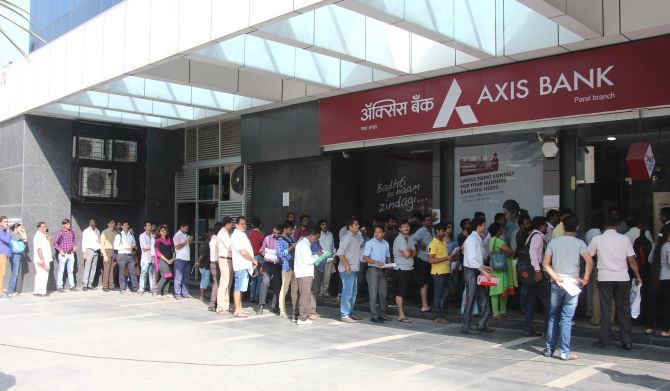
'India is still a cash economy.'
'For a common household, almost everything from grocery to maid services is paid in cash.'
'The demonetised notes account for 85 per cent of the currency in circulation.'
'Until fresh notes flow back into the economy, day-to-day transactions ordinarily done in cash will be impacted.'
The past week has seen big moves on the market following major surprises, including the decision to demonetise high value currency notes.
Motilal Oswal, chairman and managing director, Motilal Oswal Financial Services, tells Vishal Chhabria/Business Starndar he is confident the country will emerge stronger after the temporary hardship.
How do you see the demonetisation move impacting near-term earnings of India Inc, and economic growth?
India is still a cash economy.
For a common household, almost everything from grocery to maid services is paid in cash.
The demonetised notes account for 85 per cent of the currency in circulation.
Until fresh notes flow back into the economy, day-to-day transactions ordinarily done in cash will be impacted.
Purchases of almost all high-ticket items where cash was to be used will be deferred.
All this will reflect adversely on consumption growth.
The impact on the unorganised and micro-to-small organised sectors, which thrive on cash, will be substantial.
With limited access to liquidity, these companies will face hardships. Also, as consumption will be hurt, there will be pressure on the repaying capacity of producers/sellers.
Short-term lenders might witness a rise in non-performing loans, hurting their ability to lend more.
Yes, the earnings of India Inc, as well as economic growth, will be hurt in the near term.
However, the longer-term prospects of the economy remain bright and I am confident we will emerge stronger, after the temporary hardship.
With the US Federal Reserve seen as hiking rates soon and the dollar index showing strength, do you see money flows slowing or going out of India?
There is good appetite for India.
Look at the two-three big transactions, including Vodafone and Essar Steel. Each is worth over $10 billion.
This shows the right opportunities will keep attracting big money into India.
There is also enough political comfort. Foreign direct investors would not like to miss out on India.
China is slowing and India is the biggest growth story.
We are seeing a combination of low inflation and low interest rates.
With lower interest rates and lower inflation, we will see better demand and growth, which will support market sentiment.
Also, look at the domestic inflow data. Even if we see a similar level of FII (foreign institutional investor) inflow as last year, apart from the money coming through IPOs (initial public offering) and from domestic investors, liquidity in the market is quite good.
Coming to debt, yes, government security yields have declined about 300 basis points over two-three years, to around 6.75 per cent. But, abroad, trillions of dollars are lying at close to zero per cent.
Even if the Fed were to hike rates, the gap would still be sizable.
In the global context, when interest rates are near zero abroad, those in India are still high.
But the markets aren't cheap and mid-caps have seen strong gains. Do you expect the markets to correct?
Valuations are not the same any more.
But after two bad years, at the aggregate level, we see Sensex earnings growing by 13 per cent.
For FY18, we expect an 18 to 20 per cent earnings growth.
Many sectors are doing well due to a low base. Oil marketing companies and cement companies are reporting good profits.
Capital goods and metals are also coming off from a low base.
For automobiles, the base is high, but the sector is doing well.
NBFCs (non-bank finance companies) are also doing well.
Yes, stock prices have gone up. But valuations factor in elements like the outlook on interest rate, liquidity and corporate profit growth.
While valuations might seem high, there are many comforting factors.
In the short term, there could be correction, but the longer-term prospects remain bright.
In which areas can M&A (merger & acquisition) activity pick up?
And how is your business doing?
There is a lot of interest in that area. India has got a large number of SMEs (small and medium enterprises) in pharmaceuticals, FMCG (fast-moving consumer goods) and other sectors, where there is significant opportunity for consolidation.
For us, for the first time after three years of small losses, there will be much higher profits in our investment banking business.
Equity deals, IPOs, QIPs -- a lot is happening. Within equity, in which areas are you overweight?
Housing finance, oil marketing, automobiles, cement, pharmaceuticals, tyres and fast moving consumer goods are sectors to invest in, selectively.
IT (information technology) might still take some time to recover, so should telecom, infra and steel.
Within infra, it could be a good time to look at road EPC (engineering, procurement, construction) companies.







 © 2025
© 2025